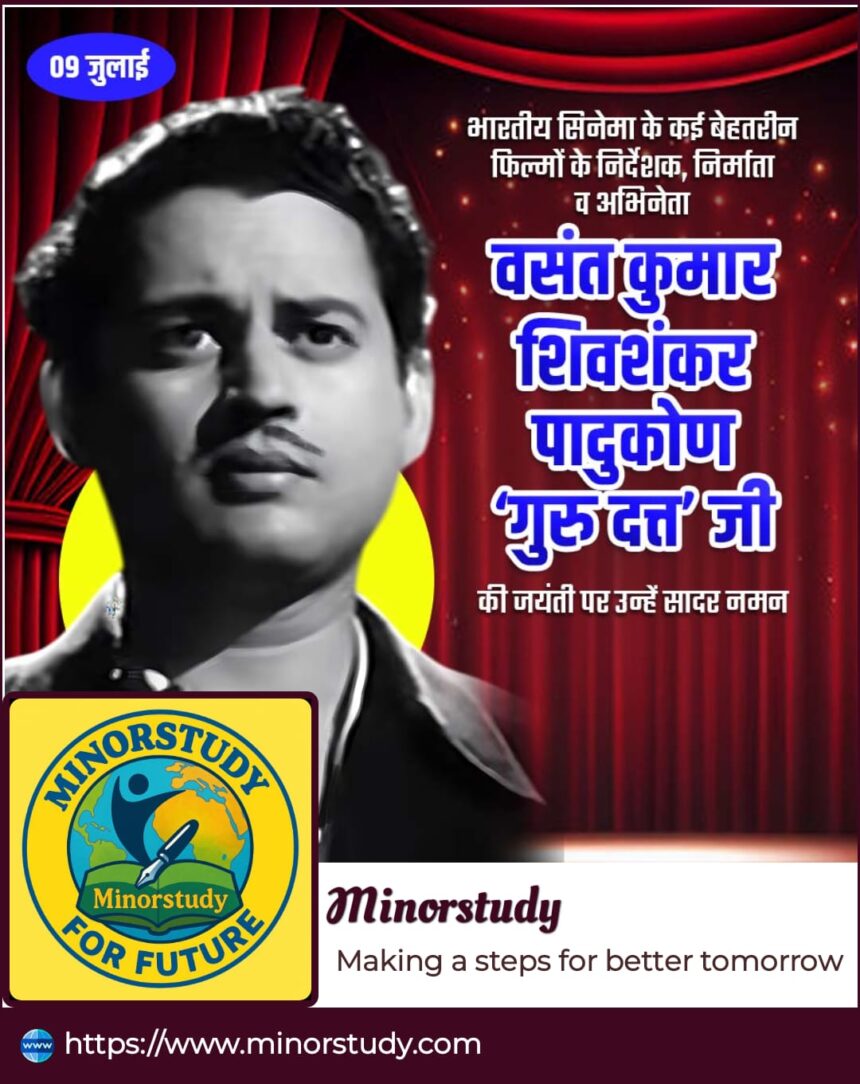Vasant Kumar Anjal Padukone ‘Guru Dutt’ Ji: 7 Untold Truths That Shaped Indian Cinema Forever
Guru Dutt Ji, born as Vasant Kumar Anjal Padukone, is a name that echoes with artistry, melancholy, and unmatched cinematic brilliance in Indian film history. His contribution to Indian cinema transcends beyond storytelling—he brought poetry to motion pictures. His life, though tragically short, was a blend of creativity, innovation, emotional depth, and visionary direction. This article will walk you through his history, legacy, facts, FAQs, timeline, significance, personal impact, and how his life continues to influence our daily thinking and society at large.
- 🔹 History of Guru Dutt Ji
- 🔹 7 Powerful Facts About Guru Dutt Ji
- 🔹 Timeline of Guru Dutt’s Life & Career
- 🔹 FAQs About Guru Dutt Ji
- 🔹 Significance of Guru Dutt Ji’s Work
- 🔹 Wishing Guru Dutt Ji on His Birth Anniversary (9 July)
- 🔹 Importance in Our Life & Society
- 🔹 Important Points to Remember
- 🔹 Conclusion: Daily Life Impact of Guru Dutt Ji’s Legacy
- ✨ Final Tribute: Guru Dutt Ji, The Light That Faded Too Soon, But Never Died
🔹 History of Guru Dutt Ji
Guru Dutt Ji was born on 9 July 1925 in Bangalore, in a Saraswat Brahmin family. His early life was steeped in cultural richness. Though born Vasant Kumar Padukone, he adopted the name “Guru Dutt” as his professional identity, blending spirituality with artistic finesse.
Raised in Calcutta (now Kolkata), Dutt was influenced by Bengali literature, dance, and theatre. He studied at Uday Shankar’s India Cultural Centre, where he was trained in classical dance and drama—skills that later infused elegance into his cinematic direction.
He began his career as a choreographer with Prabhat Film Company in Pune and later found his way into acting and direction. His early association with Dev Anand and Gyan Mukherjee paved the way for future collaborations that would become legendary.
🔹 7 Powerful Facts About Guru Dutt Ji
Inventor of Visual Poetry:
Guru Dutt’s films like Pyaasa (1957) and Kaagaz Ke Phool (1959) transformed Indian cinema with their lyrical storytelling and haunting visuals.Pioneer of the Golden Age:
He was among the key figures of Indian cinema’s “Golden Age” (1950s–1960s) alongside Raj Kapoor, Bimal Roy, and Mehboob Khan.International Recognition Before Globalization:
Pyaasa was included in Time magazine’s All-Time 100 Movies list, and Kaagaz Ke Phool is considered the first Indian film in CinemaScope.Multifaceted Talent:
He directed, produced, acted, choreographed, and even wrote dialogues—being a complete cinema craftsman.Personal Struggles, Professional Brilliance:
Despite a successful career, Guru Dutt battled with personal loneliness and depression, making his films deeply introspective.Legacy Lives Through Dev Anand & Waheeda Rehman:
His close friendships with Dev Anand and Waheeda Rehman were not only personal but also the soul of many of his films.Tragic Death, Eternal Impact:
Guru Dutt passed away on 10 October 1964 at the young age of 39—believed to be a suicide. Yet, his work continues to inspire filmmakers globally.
🔹 Timeline of Guru Dutt’s Life & Career
| Year | Milestone |
|---|---|
| 1925 | Born in Bangalore on 9 July |
| 1944 | Joined Prabhat Film Company |
| 1947 | First job as a choreographer |
| 1951 | Directorial debut: Baazi (with Dev Anand) |
| 1954 | Aar Paar—first big commercial success |
| 1957 | Pyaasa released—hailed as a masterpiece |
| 1959 | Kaagaz Ke Phool—initial failure, later a cult film |
| 1960 | Chaudhvin Ka Chand—commercial success |
| 1962 | Sahib Bibi Aur Ghulam—acclaimed nationally |
| 1964 | Passed away at 39 under tragic circumstances |
🔹 FAQs About Guru Dutt Ji
Q1. What was Guru Dutt’s real name?
A: Vasant Kumar Anjal Padukone.
Q2. What genre of films was Guru Dutt famous for?
A: Romantic tragedies, social dramas, and poetic cinema.
Q3. Was Guru Dutt recognized internationally?
A: Yes, especially for Pyaasa and Kaagaz Ke Phool, which gained global appreciation years after their release.
Q4. Did Guru Dutt win any awards?
A: Though underappreciated during his time, he won Filmfare Awards and posthumous recognitions globally.
Q5. What is Guru Dutt’s legacy today?
A: He is a subject of academic studies, film retrospectives, and modern reinterpretations in cinema schools worldwide.
🔹 Significance of Guru Dutt Ji’s Work
Guru Dutt wasn’t merely a filmmaker; he was a philosopher of emotions, projecting the struggles of the common man, unrequited love, existential crises, and the loneliness of success.
His storytelling wasn’t loud—it was subtle, soulful, and reflective. Films like Pyaasa captured the emotional bankruptcy of a materialistic society, while Kaagaz Ke Phool narrated the downfall of fame with heart-wrenching honesty.
His cinematography, often in collaboration with V.K. Murthy, introduced light and shadow play that was ahead of its time.
🔹 Wishing Guru Dutt Ji on His Birth Anniversary (9 July)
On this day, we pay heartfelt tribute to Guru Dutt Ji—a soul who dared to dream differently. 🌹
“Your silence spoke louder than dialogues. Your frames painted emotions. You made the screen weep and smile. We bow to you, Guru Dutt Ji.”
🙏 Happy Birth Anniversary to the timeless legend of Indian cinema! 🎬
🔹 Importance in Our Life & Society
For Aspiring Artists:
Guru Dutt’s journey is an emotional guidebook for every filmmaker, poet, and dreamer struggling to balance art and life.For Society:
His films question the very moral and ethical structure of post-independence India—capitalism, exploitation, and neglect of the sensitive soul.For Youth:
His story is a reminder about mental health, emotional intelligence, and the loneliness that fame cannot cure.In Education & Arts:
He is a frequent subject of film studies, retrospectives, and cultural discussions in cinema schools across the world.
🔹 Important Points to Remember
First Indian director to use CinemaScope: In Kaagaz Ke Phool.
Frequent Collaborators: Waheeda Rehman, Johnny Walker, Abrar Alvi, V.K. Murthy.
Themes: Love, disillusionment, existentialism, poetic justice.
Impactful Music: Collaborated with S.D. Burman and Sahir Ludhianvi for soul-stirring music.
Influenced Generations: From Anurag Kashyap to Sanjay Leela Bhansali.
🔹 Conclusion: Daily Life Impact of Guru Dutt Ji’s Legacy
Even today, every emotionally layered, visually poetic, and socially conscious Indian film carries a bit of Guru Dutt’s spirit. His legacy teaches us:
To find beauty in sadness.
To let emotions drive creativity.
To know that art is eternal, even when the artist isn’t.
Guru Dutt’s life reminds us that it’s okay to feel deeply, to dream beyond boundaries, and to accept that real success lies in touching hearts, not just numbers.
✨ Final Tribute: Guru Dutt Ji, The Light That Faded Too Soon, But Never Died
🕯️ He left us early, but his vision still lights up the screen.
🎞️ He gave India not just films, but immortal poetry wrapped in celluloid.
🌟 He is not forgotten. He is eternal.









Hello my loved one! I wish to say that this post is awesome, nice written and come with approximately all significant infos. I?¦d like to look more posts like this .